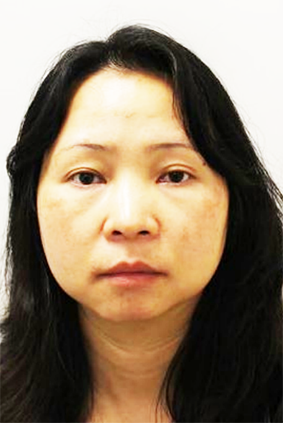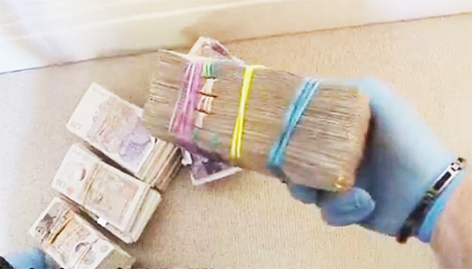Specialist CPS team involved in UK’s largest Bitcoin seizure
22 Mar 2024 11:53 AM
An ex-takeaway worker has been convicted (Wednesday 20 March 2024) of laundering the proceeds which saw her rise from living above a Chinese restaurant to residing in a multi-million pound house in an affluent part of North London.
Jian Wen, 42, was found guilty at Southwark Crown Court of an offence relating to money laundering.

Jian Wen
A Metropolitan Police investigation resulted in the CPS seizure of Bitcoin wallets from Wen, with an initial estimated value in excess of £2 billion. Prosecutors told the court the sheer scale of the seized Bitcoin, the lack of any legitimate evidence for how it was acquired and its connection to a massive investment fraud in China, all indicated that it was criminal property. The original fraud and acquisition of the Bitcoin was undertaken by another suspect who is yet to be arrested and brought before the court. Wen was involved in converting significant amounts of Bitcoin into cash and other expensive assets, on behalf of the international fraudster.
Prior to working for her “employer”, Wen lived a modest lifestyle in Leeds, with declared earnings in 2015 and 2016 of just £12,800 and £5,979. Her fortune changed significantly when she met the fellow Chinese national who was the source of the Bitcoin.
In 2017, they moved into a six-bedroom property in London, at a rental cost of over £17,000 each month. The two women presented themselves as successfully operating an international jewellery business, with Wen operating as the English-speaking and apparently legitimate front person for her employer. Wen was later joined by her young son, who moved from China to attend a private school in the UK, benefitting from her newly affluent lifestyle. Wen later stated that she had been gifted 3,000 Bitcoin, then valued at approximately £15 million, by her employer.

Manor House, North London, the property Wen moved into in 2017
Between Autumn 2017 and late 2018, Wen made efforts to purchase properties in London, valued at £4.5 million, £23.5 million, and £12.5 million. She was hampered by difficulties converting sufficient Bitcoin into Sterling and by “know your customer” questions asked of her under anti-money laundering regulations. When challenged about the source of the proposed funding for the property purchases, Wen claimed it came from legitimate sources including Bitcoin mining, a claim that was ultimately not accepted by those she instructed to assist with the sale.
Between 2017 and 2019, Wen also travelled abroad extensively, throughout Europe and elsewhere, largely enabling the conversion of large amounts of Bitcoin into more tangible assets. A receipt addressed to Wen, for example, showed jewellery worth tens of thousands of pounds had been purchased in Zurich. In 2019, she travelled to Dubai, arranging to view a number of properties for sale. In October and November of that year, she went on to purchase two properties in Dubai. Their value in total amounted to more than £500,000.
Throughout the course of the investigation and subsequent trial, Wen denied knowing that any of the Bitcoin was derived from criminality and had no suspicions about its scale.

Piles of cash discovered during police searches connected to Wen
The CPS Proceeds of Crime Division used its civil powers to obtain a Property Freezing Order from the High Court against Wen whilst it undertakes a non-conviction-based civil recovery investigation. That investigation could result in the forfeiture of the seized Bitcoin regardless of whether Wen or the other suspect are convicted.
Andrew Penhale, Chief Crown Prosecutor, recently said:
“Bitcoin and other cryptocurrencies are increasingly being used by organised criminals to disguise and transfer assets, so that fraudsters may enjoy the benefits of their criminal conduct. This case, involving the largest cryptocurrency seizure in the UK, illustrates the scale of criminal proceeds available to those fraudsters.
“Although the original fraudster remains at large, the Metropolitan Police and CPS have successfully secured a money laundering conviction against Jian Wen, an individual employed to launder criminal proceeds. The CPS will now work to ensure, through criminal confiscation and civil proceedings, that the criminal assets remain beyond the fraudsters’ reach.
“The CPS is committed to working closely with law enforcement and investigatory authorities, to bring to justice individuals and companies who engage in laundering criminal proceeds through cryptocurrency.”
Adrian Foster, Chief Crown Prosecutor recently said:
“The CPS has used the full range of our criminal and non-conviction based civil asset recovery powers, to firstly freeze and then look to seize the very large quantity of cryptocurrency and other assets, used by Wen and her “employer” to fund their extravagant lifestyle.
“We have worked with the Police to obtain freezing orders preserving all the seized cryptocurrency, and a CPS-led civil recovery investigation is running to establish that the frozen cryptocurrency is criminal property and to seek its forfeiture.”
Detective Chief Superintendent Jason Prins, Metropolitan Police, whose team led the investigation, recently said:
“Thanks to the hard work and perseverance of highly skilled detectives in the Met, we have been able to disrupt a sophisticated economic crime operation – the sheer scale of which demonstrates how international criminals seek to exploit cryptocurrency online.
“Our team have helped secure justice today and have persevered to trace this Bitcoin and identify the criminality it was linked to.
“Today’s verdict and lengthy five-year investigation demonstrates that we’ll leave no stone unturned in our pursuit to catch criminals who look to enjoy the proceeds of illicit funds – no matter how complex the case.”
Notes to Editors
- Andrew Penhale is the Chief Crown Prosecutor for the Regional and Wales Division of the CPS Serious Economic, Organised Crime and International Directorate
- Adrian Foster is the Chief Crown Prosecutor for CPS Proceeds of Crime Division of the Serious Economic, Organised Crime and International Directorate
- Jian Wen (DOB: 25/12/1981) has been found guilty of one count of entering into or becoming concerned in a money laundering arrangement at Southwark Crown Court and is due to be sentenced on 10 May 2024
- Where a defendant refuses to pay their Confiscation Order in a timely way, CPS Proceeds of Crime Division can invite the court to impose an additional default sentence on them of up to 14 years' imprisonment. The full debt continues to be in force until it is paid, and interest is charged against it at the civil judgement debt rate, currently 8%
- Where they are found to have additional available assets in the future, the CPS may ask the court to revisit the order and make an additional confiscation order up to the value of their full criminal benefit